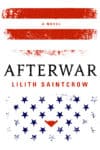 So I’ve talked a little bit about the research involved in Afterwar. I finished the zero in March 2017, promptly burst into tears, and hoped the worst was over.
So I’ve talked a little bit about the research involved in Afterwar. I finished the zero in March 2017, promptly burst into tears, and hoped the worst was over.
Generally, when you finish a zero, it is. Revisions might be hell, the publication process frustrating, but generally the worst, most damaging, draining, and difficult work, is behind me.
That was not so this time.
There are various bad-luck things that can strike during the publication process, and in my thirteen-plus years in the industry, I’ve seen pretty much all of them. “Orphaned” when your editor moves to a new house? Been there. Payment snafus? Oh, yeah. Copyeditor decides they want to rewrite instead of, well, copyediting? Yep. Issues with the proof pass? Oh, yeah, we’ve done that. On, and on, and on. Normally a book will only have one or at most two big problems during the pub process.
Afterwar, being an overachiever, had them ALL. The only boxes it didn’t check on the Pub Problem Bingo Card were “revenge editing”1 and “cover woes”2. Orphaned twice, under time-crunches for everything, Muphy’s Law laughing every time I thought “this shouldn’t be a problem, we’ve done this for ten fucking years together, it’s gonna be fine…”, and then there was the CE and afterward the proof pass and I ended up calling my agent in tears, saying, “THEY CAN HAVE THE MONEY, JUST GIVE ME THE BOOK BACK. I DON’T WANT TO DO THIS ANYMORE.”
My agent managed to talk me down from the ledge each time, because for over a decade I’ve been able to rely upon her judgment when she tells me I’m overreacting. This time, she said, “You’re not overreacting. This looks really bad from your point of view, and it’s hella stressful, but it’s not personal. It’s things that are out of everyone’s control, including yours.” Just having that validation made me more inclined to work through the problems. And each new editor I was handed to was someone I knew and trusted, since I’ve been with that publisher for so long.
To be absolutely fair, even though everything went wrong at every step of the process, the other people involved–art department, head publisher, every editor, the long-suffering production folks who, I’m sure, more than once wanted to strangle me–hit home runs and pulled out a miracle every time. It got so bad that whenever I saw a New York area code pop up on my phone or an email from agent or publisher in my inbox I almost had a panic attack thinking “what the fuck next?”
Then, once the proof disasters had been fixed and the my nerves were starting to regrow a protective sheath, a book died on me. Flat-out died. I spent months trying to resurrect it, and heaving into my office wastebasket each time I tried to work on it. That’s only happened once before3 and eventually I was able to resurrect that book; I hold out no hope it will happen a second time.
In short, everything that could go wrong did, and I still feel a strange flutter every time I see Afterwar‘s cover. It’s a goddamn good thing it wasn’t my first experience with publishing, because I would have left the industry and never looked back. I am super-grateful that at least I had enough experience to know the difficulties were not normal, just bad luck.
I joked more than once that if the printers didn’t burn and sink into a marsh, or if the entire production run didn’t sink into the sea during shipment, I would count it a win.
It wasn’t really a joke.
Anyway, release day came, and crushing, malignant stress retreated for a day or two. I was too busy with my usual round of release day rituals.
And then, as I knew would happen inevitably, the hate mail began to arrive.
To be continued…
ETA: You know, I was going to talk about the hatemail, but it makes me tired. I’ll continue at some other time.